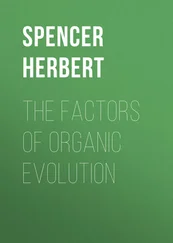Meanwhile, how would the surfaces of the upheaved masses be occupied? At first their deserts of naked rocks would bear only the humblest forms of vegetal life, such as we find in grey and orange patches on our own rugged mountain sides; for these alone could flourish on such surfaces, and their spores would be the most readily transported. When, by the decay of such protophytes, and that decomposition of rock effected by them, there had resulted a fit habitat for mosses; these, of which the germs might be conveyed in drifted trees, would begin to spread. A soil having been eventually thus produced, it would become possible for plants of higher organization to find roothold; and as the archipelago and its constituent islands grew larger, and had more multiplied relations with winds and waters, such higher plants might be expected ultimately to have their seeds transferred from the nearest lands. After something like a Flora had thus colonized the surface, it would become possible for insects to exist; and of air-breathing creatures, insects would manifestly be among the first to find their way from elsewhere. As, however, terrestrial organisms, both vegetal and animal, are less likely than marine organisms to survive the accidents of transport from distant shores; it is inferable that long after the sea surrounding these new lands had acquired a varied Flora and Fauna, the lands themselves would still be comparatively bare; and thus that the early strata, like our Silurians, would afford no traces of terrestrial life. By the time that large areas had been raised above the ocean, we may fairly suppose a luxuriant vegetation to have been acquired. Under what circumstances are we likely to find this vegetation fossilized? Large surfaces of land imply large rivers with their accompanying deltas; and are liable to have lakes and swamps. These, as we know from extant cases, are favourable to rank vegetation; and afford the conditions needful for preserving it in coal-beds. Observe, then, that while in the early history of such a continent a carboniferous period could not occur, the occurrence of a carboniferous period would become probable after long-continued upheavals had uncovered large areas. As in our own sedimentary series, coal-beds would make their appearance only after there had been enormous accumulations of earlier strata charged with marine fossils.
Let us ask next, in what order the higher forms of animal life would make their appearance. We have seen how, in the succession of marine forms, there would be something like a progress from the lower to the higher: bringing us in the end to predaceous molluscs, crustaceans, and fish. What are likely to succeed fish? After marine creatures, those which would have the greatest chance of surviving the voyage would be amphibious reptiles; both because they are more tenacious of life than higher animals, and because they would be less completely out of their element. Such reptiles as can live in both fresh and salt water, like alligators; and such as are drifted out of the mouths of great rivers on floating trees, as Humboldt says the Orinoco alligators are; might be early colonists. It is manifest, too, that reptiles of other kinds would be among the first vertebrata to people the new continent. If we consider what will occur on one of those natural rafts of trees, soil, and matted vegetable matter, sometimes swept out to sea by such currents as the Mississippi, with a miscellaneous living cargo; we shall see that while the active, hot-blooded, highly-organized creatures will soon die of starvation and exposure, the inert, cold-blooded ones, which can go long without food, will live perhaps for weeks; and so, out of the chances from time to time occurring during long periods, reptiles will be the first to get safely landed on foreign shores: as indeed they are even now known sometimes to be. The transport of mammalia being comparatively precarious, must, in the order of probability, be longer postponed; and would, indeed, be unlikely to occur until by the enlargement of the new continent, the distances of its shores from adjacent lands had been greatly diminished, or the formation of intervening islands had increased the chances of survival. Assuming, however, that the facilities for immigration had become adequate; which would be the first mammals to arrive and live? Not large herbivores; for they would be soon drowned if by any accident carried out to sea. Not the carnivora; for these would lack appropriate food, even if they outlived the voyage. Small quadrupeds frequenting trees, and feeding on insects, would be those most likely both to be drifted away from their native lands and to find fit food in a new one. Insectivorous mammals, like in size to those found in the Trias and the Stonesfield slate, might naturally be looked for as the pioneers of the higher vertebrata. And if we suppose the facilities of communication to be again increased, either by a further shallowing of the intervening sea and a consequent multiplication of islands, or by an actual junction of the new continent with an old one, through continued upheavals; we should finally have an influx of the larger and more perfect mammals.
Now rude as is this sketch of a process that would be extremely elaborate and involved, and open as some of its propositions are to criticisms which there is no space here to meet; no one will deny that it represents something like the biologic history of the supposed new continent. Details apart, it is manifest that simple organisms, able to flourish under simple conditions of life, would be the first successful immigrants; and that more complex organisms, needing for their existence the fulfilment of more complex conditions, would afterwards establish themselves in something like an ascending succession. At the one extreme we see every facility. The new individuals can be conveyed in the shape of minute germs; immense numbers of these are perpetually being carried in all directions to great distances by ocean-currents—either detached or attached to floating bodies; they can find nutriment wherever they arrive; and the resulting organisms can multiply asexually with great rapidity. At the other extreme, we see every difficulty. The new individuals must be conveyed in their adult forms; their numbers are, in comparison, utterly insignificant; they live on land, and are very unlikely to be carried out to sea; when so carried, the chances are immense against their escape from drowning, starvation, or death by cold; if they survive the transit, they must have a pre-existing Flora or Fauna to supply their special food; they require, also, the fulfilment of various other physical conditions; and unless at least two individuals of different sexes are safely landed, the race cannot be established. Manifestly, then, the immigration of each successively higher order of organisms, having, from one or other additional condition to be fulfilled, an enormously-increased probability against it, would naturally be separated from the immigration of a lower order by some period like a geologic epoch. And thus the successive sedimentary deposits formed while this new continent was undergoing gradual elevation, would seem to furnish clear evidence of a general progress in the forms of life. That lands thus raised up in the midst of a wide ocean, would first give origin to unfossiliferous strata; next, to strata containing only the lowest marine forms; next to strata containing only the higher marine forms, ascending finally to fish; and that the strata above these would contain reptiles, then small mammals, then great mammals; seems to us demonstrable. And if the succession of fossils presented by the strata of this supposed new continent, would thus simulate the succession presented by our own sedimentary series; must we not conclude that our own sedimentary series very possibly records nothing more than the phenomena accompanying one of these great upheavals? The probability of this conclusion being admitted, it must be admitted that the facts of Paleontology can never suffice either to prove or disprove the Development Hypothesis; but that the most they can do is to show whether the last few pages of the Earth's biologic history, are or are not in harmony with this hypothesis—whether the existing Flora and Fauna can or can not be affiliated upon the Flora and Fauna of the most recent geologic times.
Читать дальше












